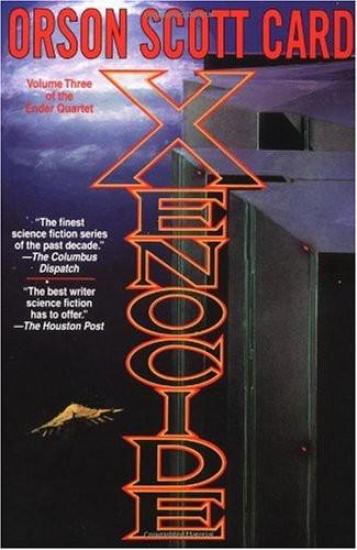
Series: Book 3 in the Ender series
Rating: ***
Tags: EN-SciFi, Lang:en
Summary
Orson Scott Card's
Xenocide is a space opera with verve. In this
continuation of Ender Wiggin's story, the Starways Congress
has sent a fleet to immolate the rebellious planet of
Lusitania, home to the alien race of
pequeninos, and home to Ender Wiggin and his family.
Concealed on Lusitania is the only remaining Hive Queen, who
holds a secret that may save or destroy humanity throughout
the galaxy. Familiar characters from the previous novels
continue to grapple with religious conflicts and family
squabbles while inventing faster-than-light travel and
miraculous virus treatments. Throw into the mix an entire
planet of mad geniuses and a self-aware computer who wants to
be a martyr, and it's hard to guess who will topple the first
domino. Due to the densely woven and melodramatic nature of
the story, newcomers to Ender's tale will want to start
reading this series with the first books,
and .
--Brooks Peck
Card returns to the highly popular, award-winning story of
Andrew "Ender" Wiggin, the boy wonder who saved humanity from
alien invasion and, guilt-ridden over his near-total
destruction of the alien species, has now become a sort of
traveling conscience. This third Ender novel picks up where
Speaker for the Dead left off: on the planet Lusitania, Ender
and the other human colonists strive to neutralize the
"descolada," a possibly sentient virus that adapts itself
rapidly to every attack. Meanwhile, tensions are rising
between the colonists and the indigenous "pequeninos," who
rely on the descolada for their survival; and the fleet sent
by Starways Congress to destroy the rebellious colony closes
in with its doomsday weapon. With the help of their family,
their pequenino friends, and Jane (an artificial intelligence
living in the galactic computer network), Ender and his
sister Valentine race against time to resolve these crises.
The plot is sometimes compelling, but the novel's many flaws
make the book more often dull and irritating. Card's style is
openly didactic, and when his characters do veer away from
lengthy philosophical and scientific ruminations, they
venture into contrived personality conflicts and endless
self-deprecation. Some, notably Ender, Valentine and the
wonderchild Wang-mu, are simply too good to be true--too
smart, too reasonable, too kind and generous. The reader
quickly tires of such impossible perfection.
Amazon.com Review
From Publishers Weekly
Copyright 1991 Reed Business Information, Inc.